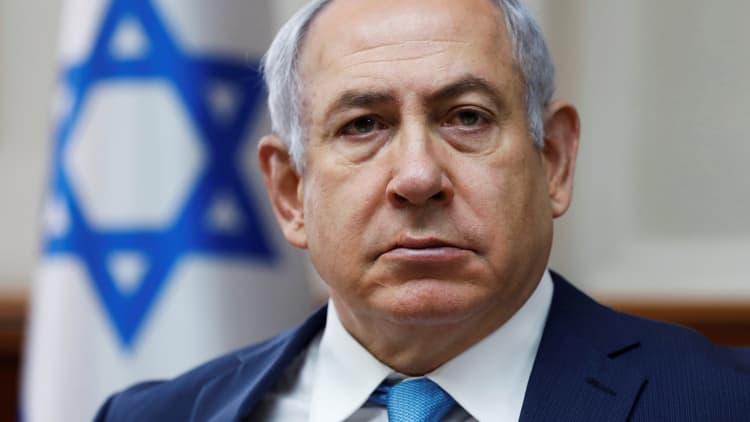
Israeli Prime Minister Benjamin Netanyahu on Monday revealed a cache of files he claims were obtained from Iran and prove the country ran a secret program to build nuclear weapons.
However, the trove of data did not contain new information that was not known to diplomats who negotiated the landmark Iran nuclear deal in 2015. Iran-watchers said the press conference appeared calculated to embolden Trump to scrap the accord.
To be sure, Iranian leaders have long said their nuclear program is only for peaceful purposes. But Netanyahu on Monday unveiled tens of thousands of pages of documents that he said undercut those claims.
"Tonight I'm here to tell you one thing. Iran lied, big time," he said.
Netanyahu's office billed the televised statement as a "significant development" regarding the Iran nuclear deal, but it largely presented evidence to prove what the world long ago accepted: that Iran sought to develop nuclear arms.
That acknowledgement marshaled international support for a U.S. campaign to impose a tough series of sanctions against Iran. The impact of those sanctions brought Iran to the negotiating table and ultimately led to the 2015 Iran nuclear deal.
Netanyahu's remarks come less than two weeks before U.S. President Donald Trump must decide whether to continue suspending sanctions against Iran under that deal, or restore the penalties on one of the world's biggest oil producers.
The files presented by Netanyahu were allegedly copied from a "highly secret location" in Iran. They detail Project Amad, which Netanyahu described as "a comprehensive program to design, build and test nuclear weapons" in operation between 1999 and 2003.
He said the files provided "new and conclusive proof of the secret nuclear weapons program that Iran has been hiding for years from the international community in its secret atomic archive."
However, the only new fact Netanyahu revealed on Monday was that Iran allegedly moved the documents in 2017, according to Thomas Countryman, former acting undersecretary of State for arms control and international security.
"Everything else he said were things we knew 10 years ago or more," Countryman told CNBC. "It was very much in our minds as we negotiated and it's specifically why the agreement is so detailed."
Contrary to Netanyahu's suggestion on Monday, there is no provision in the nuclear deal that requires Iran to destroy documents related to its past nuclear tests or that it fess up to operating the illicit program, said Countryman, now chair of the Arms Control Association's board of directors.
In a tweet, Iranian Foreign Minister Javad Zarif accused Netanyahu of resurfacing "old allegations" already fielded by the International Atomic Energy Agency ahead of Trump's decision in a bid to "nix" the nuclear deal.
Helima Croft, global head of commodity strategy at RBC Capital Markets, said Netanyahu's statement appeared timed to make sure Trump does not extend the sanctions waivers next week.
The televised announcement followed a meeting this past weekend between Netanyahu and newly sworn-in Secretary of State Mike Pompeo, a prominent Iran hawk.
"We've shared this material with the United States and the United States can vouch for its authenticity," Netanyahu said on Monday.
The Obama administration negotiated the Iran nuclear deal in 2015 along with China, France, Germany, Russia and the U.K. The accord lifted a series of sanctions against Iran in exchange for Tehran accepting limits on its nuclear program and allowing international investigators access to its facilities.
The International Atomic Energy Agency and the signatories to the agreement, including Trump, have repeatedly confirmed that Iran is complying with the deal as it is written.
But the Trump administration, Israel and foreign policy hawks have long argued that the accord itself is flawed. Last year, the White House announced a major policy shift aimed at working with U.S. lawmakers and European partners to toughen the nuclear deal.
In January, Trump waived sanctions against Iran, but said he would not suspend them when the next deadline arrived on May 12 unless the United States and Europe had agreed on a path forward.
The European partners are open to starting new talks with Iran, but want to preserve the existing deal. Russia and China also continue to back the accord.
French President Emmanuel Macron is working with Iranian President Hassan Rouhani to salvage the deal, following Macron's meeting with Trump last week. At the end of his visit to Washington, Macron said he believes Trump will leave the nuclear deal for "domestic reasons."
Risk consultancy the Eurasia Group echoed the view that Netanyahu revealed little new evidence on Monday. It said the presentation was unlikely to affect U.S. or European decision-making and maintained its view that there is a 60-percent chance Trump pulls out of the nuclear deal on May 12.


